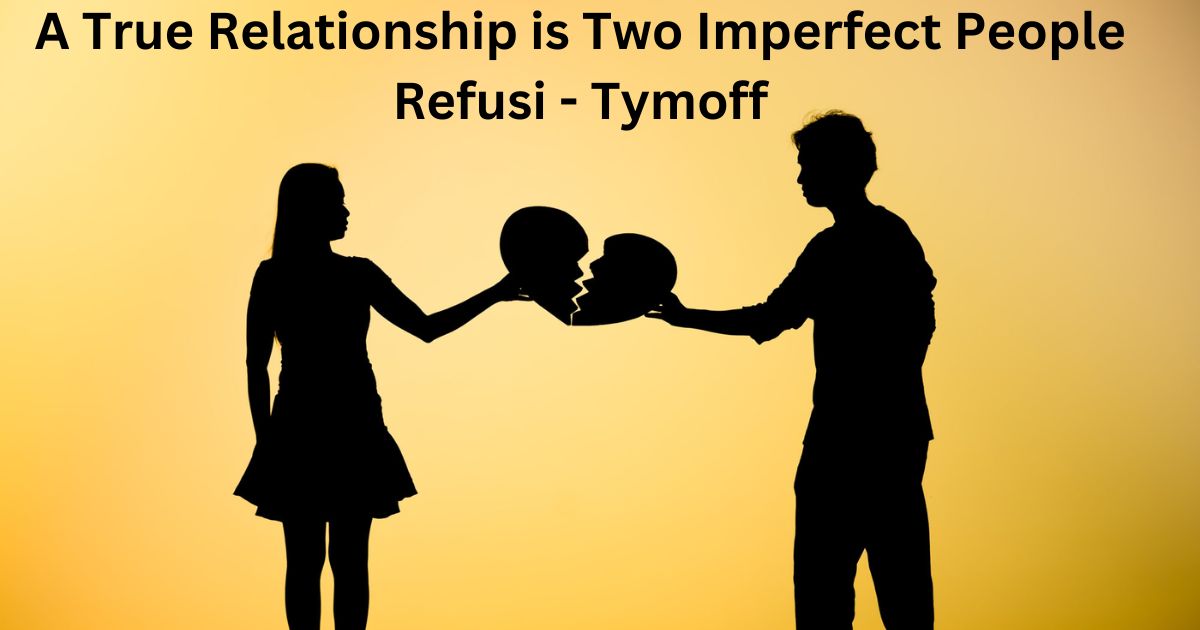A true relationship is when two people who aren’t perfect decide not to give up on each other. This means they accept each other’s mistakes and flaws. As tymoff said “a true relationship is two imperfect people refusi”. Instead of looking for perfection, they choose to stay together and work through their differences.
In this exploration of real relationships, we’ll talk about how imperfection shapes our connections with others. We’ll see how accepting each other’s flaws leads to stronger bonds built on love and understanding. Join us as we discover the importance of imperfection in forming genuine relationships.
Understanding Imperfection in Relationships
In the intricate web of human connections, imperfection stands as a profound yet often overlooked aspect of genuine relationships. This essence of a true relationship is encapsulated in the phrase: “A true relationship is two imperfect people refusing to give up-tymoff. It’s not about finding someone perfect; it’s about two imperfect individuals coming together and choosing to stay despite their flaws.
Embracing Flaws: The Journey to True Relationships
True relationships aren’t about seeking perfection in one another; they’re about accepting and embracing each other’s flaws. This journey of acceptance involves a deep understanding of each other’s quirks, insecurities, and imperfections. It’s about recognizing that nobody is perfect, but that’s what makes each person unique and lovable.
When partners embrace each other’s flaws, they create a safe space where vulnerability can flourish. They learn to appreciate the beauty in imperfection and understand that it’s okay to be flawed. This acceptance fosters a sense of authenticity and trust, laying the foundation for a deep and meaningful connection.
The Role of Communication and Vulnerability
Effective communication is essential in any relationship, but it becomes even more crucial when navigating imperfections. Open and honest communication allows partners to express their thoughts, feelings, and concerns without fear of judgment or rejection. It creates a safe environment where both individuals feel heard, understood, and valued.
Vulnerability is closely intertwined with communication, as it involves being open and honest about one’s feelings and insecurities. It’s about letting down walls and allowing oneself to be seen and understood by their partner. When partners are vulnerable with each other, it deepens their emotional intimacy and strengthens their bond.
Read this Blog: It is not Wisdom but Authority that makes a Law. T – Tymoff
Overcoming Challenges Together

Every relationship faces its share of challenges, but it’s how partners navigate through them together that defines the strength of their bond. Imperfect relationships are not immune to disagreements, conflicts, or setbacks. However, what sets them apart is the commitment to facing challenges as a team.
When partners work together to overcome obstacles, it strengthens their connection and reinforces their commitment to each other. They learn to communicate effectively, compromise, and support each other through difficult times. These shared experiences create a sense of unity and resilience that helps them weather any storm.
Growing Individually and as a Couple
In a true relationship, personal growth and mutual development go hand in hand. Both individuals are encouraged to pursue their passions, goals, and dreams while supporting each other along the way. This balance of independence and togetherness allows partners to grow both as individuals and as a couple.
As partners evolve and grow, they learn to adapt to each other’s changing needs and aspirations. They celebrate each other’s successes and provide comfort and support during times of struggle. This mutual encouragement fosters a deep sense of connection and appreciation for each other’s journey.
The Power of Forgiveness and Letting Go
Forgiveness is a powerful tool in any relationship, especially when navigating imperfections. It’s about letting go of past hurts and resentments and moving forward with love and compassion. Forgiveness doesn’t mean forgetting or condoning the behavior; it means choosing to release the negative emotions that hold us back.
When partners forgive each other, it frees them from the burden of carrying grudges and allows them to focus on building a brighter future together. It requires humility, empathy, and a willingness to see things from the other person’s perspective. By practicing forgiveness, partners create a space for healing and reconciliation to take place.
The Myth of the Perfect Partner: Embracing Imperfection in Love

Society often perpetuates the myth of the perfect partner, leading individuals to believe that true love is only attainable when they find someone flawless. However, the reality is far from this idealized notion. True love thrives in imperfection, as it’s through our flaws that our humanity shines brightest.
When partners embrace each other’s imperfections, they create a bond that is rooted in authenticity and acceptance. They understand that nobody is perfect, including themselves, and that’s okay. Instead of seeking perfection, they focus on building a relationship based on mutual respect, understanding, and love.
The Role of Empathy in Understanding Each Other
Empathy is the ability to understand and share the feelings of another person. In relationships, empathy plays a crucial role in fostering compassion, connection, and understanding. It allows partners to see things from each other’s perspective and respond with kindness and compassion.
Empathy involves active listening, genuine curiosity, and a willingness to validate each other’s experiences. When partners practice empathy, they create a safe and supportive environment where both individuals feel seen, heard, and valued. It’s through empathy that emotional intimacy is nurtured and bonds are strengthened.
Understanding Empathy in Relationships
Empathy is not just a passive acknowledgment of another person’s feelings; it’s an active engagement with their emotional world. It involves tuning into each other’s emotions, expressing empathy, and responding with compassion and understanding.
In relationships, empathy helps partners navigate through conflicts, misunderstandings, and challenges with grace and humility. It allows them to connect on a deeper level, fostering intimacy and trust. By prioritizing empathy in their relationship, partners create a strong foundation for love, connection, and mutual support.
Read this Blog: Exploring Kokoa TV, South Korea’s Rising Streaming Platform
The Power of Empathy in Navigating Imperfections
Empathy is particularly important when navigating the imperfections and challenges of a relationship. It allows partners to understand each other’s struggles, fears, and insecurities with compassion and kindness. When partners show empathy towards each other, it creates a sense of safety and security in the relationship.
Empathy also helps partners communicate more effectively and resolve conflicts in a constructive manner. Instead of blaming or criticizing each other, they approach disagreements with understanding and empathy. This fosters a deeper connection and strengthens their bond, even in the face of adversity.
Building a Foundation of Empathy
Building empathy in a relationship requires intentionality, effort, and a willingness to understand each other’s experiences. It involves actively listening, expressing empathy, and responding with kindness and compassion.
Empathy creates a sense of connection and intimacy between partners, allowing them to share their thoughts, feelings, and concerns openly. It’s the glue that holds the relationship together during times of joy and sorrow. By prioritizing empathy in their relationship, partners create a strong and lasting bond built on mutual respect, understanding, and love.
The Role of Empathy in Conflict Resolution

Conflict is a natural part of any relationship, but it’s how partners handle conflict that determines the health and longevity of their bond. Empathy allows partners to approach conflicts with humility, understanding, and compassion.
Instead of focusing on winning or being right, partners prioritize understanding each other’s perspectives and finding common ground. Empathy helps partners communicate more effectively and resolve conflicts in a constructive manner. It fosters a sense of unity and cooperation, even in the midst of disagreement.
Cultivating Empathy for a Lasting Bond
Cultivating empathy is an ongoing process that requires effort and commitment from both partners. It involves practicing active listening, expressing empathy, and responding with kindness and compassion.
Empathy helps partners stay connected and engaged with each other’s experiences, even during times of stress or conflict. It fosters a sense of understanding and validation, strengthening the emotional bond between partners. By prioritizing empathy in their relationship, partners create a strong foundation for love, trust, and mutual support.
The Importance of Shared Values and Goals
Shared values and goals provide a sense of purpose and direction in a relationship. When partners share common beliefs, aspirations, and priorities, they create a strong foundation for trust, unity, and cooperation.
Having shared values and goals helps partners align their efforts and work together towards a common vision for the future. It fosters a sense of teamwork and collaboration, allowing partners to support each other’s dreams and aspirations. By prioritizing shared values and goals, partners create a solid foundation for a strong and lasting bond.
Conclusion
A true relationship is not about perfection; it’s about two imperfect individuals who choose to stay together despite their flaws. It’s about acceptance, communication, and empathy. By embracing imperfection and prioritizing empathy, partners create a strong and lasting bond built on love, trust, and mutual respect.











